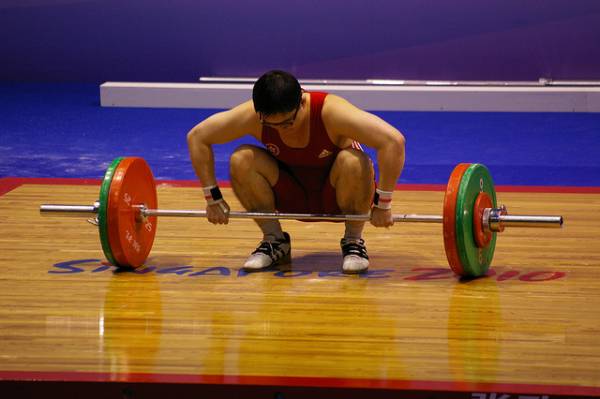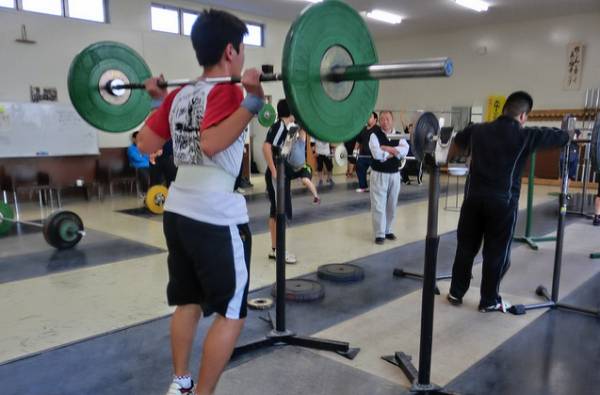In weightlifting, “youth” comprises any lifter up to December 31 of the year he or she turns seventeen. This is the youngest age for which competition is held. About a year ago I wrote in this space about my impressions gathered from attending the Pan-American Masters Weightlifting Championships (for those 35 and over). This year I decided to investigate the other end of the age range. I have just returned from the 2014 Pan-American Youth Weightlifting Championships, held in Lima, Peru.
My Experience Refereeing the Pan-Americans
The competition was held in a temporary covered venue erected just outside the national soccer stadium. I was assigned to help referee all of the men’s sessions, which turned out to be seven. As such, I was pretty busy, but I had lots of time to observe the drama around me. And there was plenty of this. The major thing at stake was the jockeying for position qualifying for the 2014 youth Olympic Games held in China later this year.
The quality of lifting varied as it always does, with some well-established countries having strong lifters, while other countries did not have so many and would have to wait for their future. My country (Canada) had only one entrant thanks to the fact that we have little funding for this level of competition. We are now forced to rely on finding individual sponsorships if we want to travel.
Fortunately, that was possible with our lifter Boady Santavy of Sarnia, Ontario who was able to come through with an impressive victory in the 85kg category. He is a fourth-generation lifter. His father Dalas (former Canadian champion) was there coaching him. Encouraging him from home was his grandfather Bob (also a former Canadian champion who I lifted against so many years ago). Looking on from above would be his great-great uncle Joe Turcotte, Bob’s first coach. This situation showed me how important it is for families to encourage their children in whatever endeavor they are attempting. But more importantly, if this endeavor is one that is part of a family tradition then it will probably be that much easier to succeed.
What Weightlifting Competition Means to the Family
For years I noticed that so many weightlifters ere seemingly sport orphans. They participated in a sport their parents knew nothing about. Even today, this still prevails, even with those who may have done some other form of weight training. This is bad enough with the fathers, but it is usually much more the case with mothers. And if the young lifter is a girl, the mother is often doubly perplexed about the interests of her youngster.
Fortunately, I came to the conclusion that my thoughts on this might be somewhat out of date. In my day, parents and grandparents were a lot less involved with their kids’ lives. Today, this all seems to have changed. True, this is a mixed blessing. Just ask any teacher or coach about “helicopter” parents. However on this trip to the land of the Andes what I saw was encouraging. The USA team in particular struck me in this regard. They had several sets of parents there not only cheering on their kids, but also helping out with team duties. Most had no experience in the sport, but were eager to learn more so as to relate better to their teenage athletes. Almost unheard of in my day.

How Modern Life Benefits the Youth Weightlifter
I was also impressed with the fact that modern international air travel is more affordable for many families. Not only can the athlete go, but so can parents. Not only that, but such travel does not upset the participants as much is it used to. Back in my early days, in the 1960s, and before the day of the jumbo jet, international travel was both expensive and rare. As such there are many surprises awaiting the inexperienced traveler that would often affect performance on the platform. Nowadays, many people, even teenagers, have experience traveling to other continents. And if they do not have such experience, then their parents often do. The upshot of all this is that there are fewer surprises and the athletes are able to take things much more in stride than they did many years ago.
Closely allied with that, I noticed cultural changes also affect competitors less. In the old days, our traveling lifters were often overwhelmed when things were not done exactly the way they were home. Food was different, travel was different, the language was different, everything. This was a time when few people traveled, so few people ever saw or experienced cultural novelty in their lives. Today, with more frequent travel, this travel shock does not occur. Even if one has not traveled far, there is at least some sort of greater awareness fostered by television. I saw no examples of the “Ugly American tourist” so often mentioned in the past. One can only hope that this trend will make international travel less traumatic for athletes.
What Impressed Me Most About the Youth Weightlifters
While these are all things that anybody would notice I was asked by one of the USA parents in particular what impressed me most about this youth level of competition. I had to give this request a bit of thought, but in the end I came up with the following:
I told her the thing that jumped out at me most was the fact these young athletes were for the most part in a lovely time in their careers. They were too young to have a lot of major disappointments that higher-level competition inevitably brings. The sport is still relatively new to them. They arrived at an elite level in the sport at a very young age. The idea of international competition is still fascinating to them. And most important of all, their futures are all ahead of them. As good as their performances may be now, they will probably be better in future.

This was a great contrast to what I saw Masters last year. There, many of the lifters preferred to talk about their performances from decades ago, as opposed to the lifts done on that day. But in my opinion, personal records set decades ago, even great ones, are good – but they are still no substitute for today’s accomplishments. Our youth athletes still have their best days ahead. Optimism about the future reigns supreme. Gray hairs and chronic injuries are still a long way in the future. These lifters will look back on this time as one where they thought that all things would be possible.
They had a TV show some years back called The Wonder Years, about kids of roughly the same age as the lifters at the Pan-Americans. Looking back from my current stage of life I now know what inspired the show’s title.
Photo 1 “Snatch” by Jamie Jamieson Attribution-ShareAlike License.
Photo 2 “Concentration” by Julie V. Attribution-NonCommercial License.
Photo 3 “DSC00734” by Yasunobu HIRAOKA Attribution-ShareAlike License.






